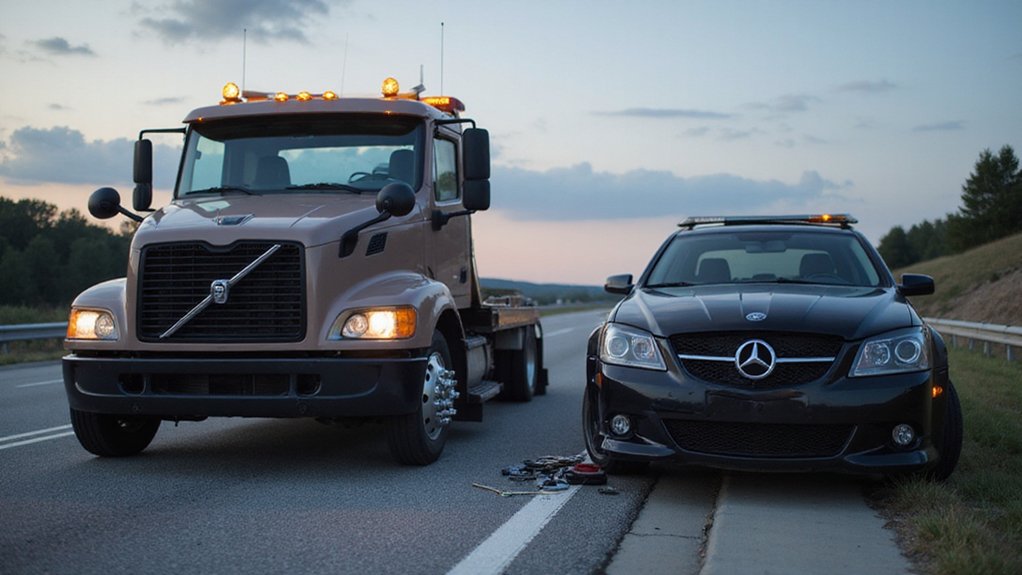Car breakdowns can leave you stranded, but you can prevent most towing scenarios. Battery issues, tire damage, overheating engines, transmission problems, and fuel system complications are common culprits. Regular maintenance like checking tire pressure, monitoring coolant levels, and servicing your electrical system can help. By staying proactive and attentive to your vehicle's warning signs, you'll reduce the likelihood of unexpected roadside emergencies. Your next steps could reveal even more prevention strategies.
Battery Failure and Electrical System Issues
When your car's battery dies or electrical system malfunctions, you could find yourself stranded on the side of the road, facing an unexpected and frustrating situation. Regular maintenance can help prevent these electrical challenges.
You'll want to check your battery's age, clean its terminals, and watch for warning signs like dim headlights or slow engine cranking. Professional mechanics recommend replacing batteries every three to five years and having your electrical system inspected annually. If you experience battery issues, emergency towing services in Northeast Ohio can quickly assist you in getting back on the road.
Flat Tires and Wheel Damage
Nearly every driver will encounter a flat tire or wheel damage at some point during their vehicle ownership experience. When these issues arise, they can quickly alter a smooth trip into a stressful roadside situation. If a flat tire occurs, consider roadside assistance services available in Northeast Ohio to help you safely manage the situation.
To minimize your risk and stay prepared, consider these essential prevention strategies:
- Regularly check tire pressure
- Inspect tires for wear and damage
- Rotate tires according to manufacturer recommendations
- Avoid rough roads and road hazards
Overheating Engine Problems
Although engine overheating can strike unexpectedly, most incidents are preventable with proper maintenance and awareness. You'll want to monitor your coolant levels regularly and check for leaks in your radiator and hoses.
If you notice your temperature gauge climbing into the red zone, pull over immediately to avoid potential engine damage. Regular service checks can help catch cooling system issues before they become serious problems.
Transmission Troubles
Transmission problems can quickly convert a smooth ride into a roadside nightmare for unsuspecting drivers. These mechanical issues can leave you stranded and facing expensive repairs if not addressed promptly. Your transmission's health depends on regular maintenance and understanding potential warning signs.
Here are key transmission trouble indicators:
- Unusual grinding or slipping sensations
- Delayed gear engagement
- Leaking transmission fluid
- Warning lights on dashboard
Catching these symptoms early can save you significant money and prevent unexpected towing situations. By staying proactive and attentive to your vehicle's performance, you'll minimize the risk of transmission failure and maintain your car's reliability.
Fuel System Complications
While fuel system issues might seem less dramatic than other automotive problems, they can quickly alter a routine drive into a stressful roadside emergency. Dirty fuel filters, clogged fuel injectors, and contaminated fuel can cause your car to sputter, stall, or refuse to start, potentially leaving you stranded.
Regular maintenance is key to preventing these complications. You'll want to replace your fuel filter according to your vehicle's recommended schedule and use high-quality fuel from reputable stations. Keep an eye on your fuel system's performance, and don't ignore warning signs like reduced fuel efficiency or unexpected engine hesitation. Proactive care can save you from costly towing expenses.
Major Mechanical Breakdowns
Just as fuel system issues can strand you on the roadside, major mechanical breakdowns represent another significant risk that might require a tow truck. These unexpected failures can quickly turn a smooth trek into a stressful situation.
Regular maintenance is your best defense against these costly breakdowns. By scheduling routine inspections, addressing warning signs promptly, and staying proactive about your vehicle's health, you'll minimize the likelihood of being stuck roadside. Your car's reliability depends on your commitment to preventative care.
Collision and Accident Recovery
Although no driver wants to imagine the worst, car accidents can happen unexpectedly, leaving you in need of professional towing services. If you've been involved in a collision, your vehicle might require immediate towing to prevent further damage and guarantee safety.
Experienced tow truck operators can carefully transport your damaged vehicle from the accident scene to a repair shop or designated location. They'll help you maneuver this stressful situation, providing a reliable solution when your car can't be driven.
Frequently Asked Questions
How Much Does a Typical Tow Truck Service Cost?
You'll likely spend $75 to $250 for a standard tow, depending on distance, time of day, and your location. Roadside assistance memberships can substantially reduce these costs.
Can I Tow My Car Myself Instead of Calling a Professional?
You can tow your car, but it's risky without proper equipment and knowledge. Professional tow trucks have specialized tools that'll safely transport your vehicle without causing additional damage.
What Should I Keep in My Car for Emergencies?
You'll want a roadside emergency kit with jumper cables, flashlight, first-aid supplies, water, non-perishable snacks, basic tools, reflective triangles, and a charged phone charger to stay prepared for unexpected car troubles.
How Quickly Can a Tow Truck Usually Arrive After Calling?
Tow truck arrival times vary, but you'll typically wait 30-60 minutes. Your wait depends on your location, time of day, and local service availability, so it's smart to have a reliable roadside assistance plan.
Will My Car Insurance Cover Towing Expenses?
Your coverage depends on your policy type. If you've added roadside assistance, you'll likely have towing expenses covered, but check the specifics of your insurance plan to confirm your exact benefits.



